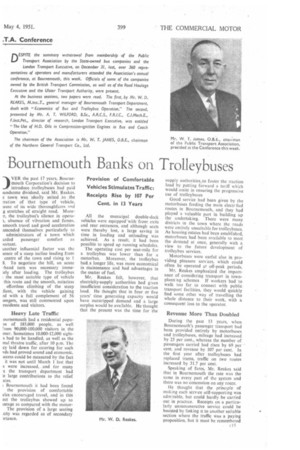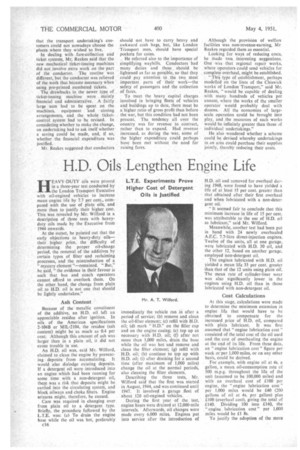- Bournemouth Banks on Trolleybuses
Page 53

Page 54

If you've noticed an error in this article please click here to report it so we can fix it.
Provision of Comfortable Vehicles Stimulates Traffic: Receipts Rise by 107 Per Cent. in 13 Years
)VER the past 17 years, Bournemouth Corporation's decision to .. introduce trolleybuses had paid iandsome dividend, said Mr. Reakes. a town was ideally suited to the :ration of that type Of vehicle. -Anse of its wide thoroughfares and g stretches of straight road, More!r, the trolleybus's silence in operas, absence of vibration and fumes. smooth travel and good acceleration amended themselves particularly to
administrators of a town which ardcd passenger comfort as iortant.
knottier influential factor was the sence of a steep incline leading from centre of the town and rising to 1 8. To negotiate the hill, an acute -hand turn was necessary irnmeely after loading. The trolleybus . the most suitable type of vehicle this route and the smooth, noiseless effortless climbing of the steep :bent, with the vehicle gaining ad with a full complement of 56 iengers, was still commented upon residents. and visitors.
Heavy Late Traffic
ournemouth had a residential popum of 185.000 people, as well 'rom 90,000-100,000 visitors in the imer. Sometimes 10.000-12,000 sights had to be handled, as well as the mal theatre traffic. after 10 p.m. The cy laid down for catering for such vds had proved sound and economic. sccess could be measured by the fact it was not until March 1 last that s were increased, and for many 's the transport department had le large contributions to the relief ales.
i Bournemouth it had been found the provision of comfortable cies encouraged travel, and in this ect the trolleybus showed up to image as compared with the motor' The provision of a large seating city was regarded as of secondary ntance. All the municipal double-deck vehicles were equipped with front exits and rear entrances, and although seats were thereby lost, a large saving in time in loading and unloading was achieved. As a result, it had been possible to speed up running schedules.
The operating cost per seat-mile for a trolleybus was lower than for a motorbus. Moreover, the trolleybus had a longer life, was more economical in maintenance and had advantages in the matter of fuel.
Mr. Reakes felt, however, that electricity-supply authorities had given insufficient consideration to the traction load. He thought that in four or five years' time generating capacity would have outstripped demand and a large surplus would be available. He thought that the present was the time for the supply authorities,to foster the traction load by putting forward a tariff which would assist in ensuring the progressive use of trolleybuses
Good service had been given by the motorbuses feeding the main electr fled routes in Bournemouth, and they had played a valuable part in building up the undertaking. There were many districts in the town where the roads were entirely unsuitable for trolleybuses. As housing estates had been established, motorbuses had been available to meet the demand at once, generally with a view to the future development of trolleybus services.
Motorbuses were useful also in providing pleasure services. which could often be operated at off-peak periods.
Mr. Reakes emphasized the importance of considering transport in townplannMg schemes If workers had to walk too far to connect with public transport facilities, they would quickly find some other way of travelling the whole distance to their work, with a consequent loss to the operator.
Revenue More Than Doubled During the past 13 years, when Bournemouth's passenger transport had been provided entirely by motorbuses and trolleybuses, mileage had increased by 25 per cent., whereas the number of passengers carried had risen by 69 per cent, and revenue by 107 per cent. In the first year after trolleybuses had replaced trams, traffic on two routes increased by 31.7 per cent.
Speaking of fares, Mr. Reakes said that in Bournemouth the rate was the same in every part of the system and there was no concession on any route.
He thought that the principle of making each service self-supporting was admirable, but could hardly be carried out in practice. Receipts on a particularly unremunerative service could be boosted by linking it to another suitable section where the traffic was a paying proposition, but it must be remembered
that the transport undertaking's customers could not nowadays choose the places where they wished to live.
In dealing with fare-collection and ticket systems, Mr. Reakes said that the new mechanical ticket-issuing machines did not involve extra work on the part of the conductor. The routine was• different, but the conductor was relieved of the work that became necessary when using pre-printed numbered tickets.
The drawbacks to the newer type of ticket-issuing machine were mainly financial and administrative. A fairly large sum had to be spent on the machines, equipment 'and storing arrangements, and ,the whole ticketcontrol system had to be revised. In considering whether to make the change, an undertaking had to ask itself whether a saving could be made, and, if so, whether the financial expenditure was justified.
Mr. Reakes suggested that conductors should not have to carry heavy and awkward cash bags, but, like London Transport men, should have special pockets for coins.
. He referred also to the importance of simplifying waybills. Conductors had many duties and these should be lightened as far as possible, so that they could pay attention to the two most important parts of their work—the safety of passengers and the collection of fares.
To meet the heavy capital charges involved in bringing fleets of vehicles and buildings up to date, there must be a higher ratio of gross profit than before the war, but this condition had not been present. The tendency all over the country was for revenue to contract, rather than to expand. Had revenue increased, as during the war, some of the higher expenditure could perhaps have been met without the need for raising fares. Although the provision of welfare facilities was non-revenue-earning, Mr Reakes regarded them as essential.
Looking for ways of reducing costs, he made two interesting suggestions. One was that regional repair works. where operators could send vehicles for complete overhaul, might be established.
"ThiS type of establishment, perhaps modelled on the lines of the Chiswick works of London Transport," said Mr. Reakes, "would be capable of dealing with many hundreds of vehicles per annum, where the works of the smaller operator would probably deal with dozens. All the economies of largescale operation could be brought into play, and the resources of such works would be infinitely greater than those of individual undertakings."
He also wondered whether a scheme could be devised whereby undertakings in an area could purchase their supplies jointly, thereby reducing their costs.




































































































